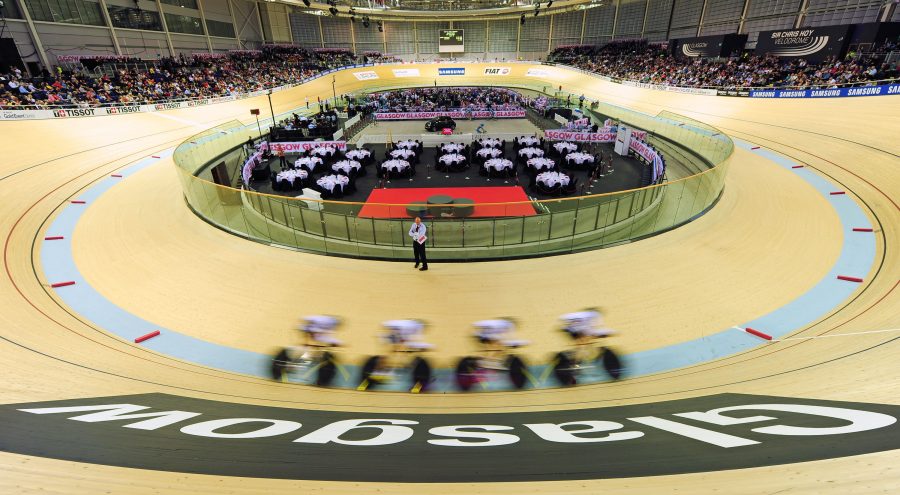9 min. read
Isabella Burczak is the Advocacy & Development Manager for the Union Cycliste Internationale (UCI), the world governing body for cycling. She is responsible for the UCI’s initiatives and partnerships with regard to the promotion of cycling for all.
Xavier Bigard is the Medical Director for the Union Cycliste Internationale (UCI). Bigard is an internationally renowned professor of sports medicine. He has written several books and contributed to eminent scientific publications, and until 2017 was President of the French Society of Sports and Exercise Medicine (SFMES).
What are the main associated physical health benefits of cycling ?
Xavier : Cycling is one of the best means to induce physical activity in a global population. It’s the case for children, adolescents and adults. We now have a lot of papers in the open literature, published in the most important journals in medicine, in which the authors all report the enhanced benefits of cycling.
What’s important is to consider cycling as a means to join the workplaces, to mobilise a population in place of cars and other means of transport, and to induce a pleasure in doing so. Cycling during leisure times is also important to promote. Authors report health benefits for cardiovascular systems, pulmonary systems, for skeletal systems in order to prevent sarcopenia in older people or adults, and in children to induce better brain health, help better maturation of the brain and to induce academic success. Communicating this is important in order to sensitise parents.
When we discuss cycling as a means to promote physical activity, it is also important to take into consideration injuries and all risks of accidents. This has been done in fewer papers in the last years, especially by research teams in Scandinavia. The conclusion is that bicycling in cities has beneficial effects even when we take into consideration the potentially negative side effects. Taking into account risk of injury of accident and physical injury is also key in order to make the needed changes in our urban environments.
We have several reasons to promote bicycling, and in my opinion it is very important for UCI to support all these programs through medical reasons, according to the three definitions of the world health organisation: physical health, mental health, and social integration. It’s important for us to leverage all the basic science that is well known as we develop our programs, and to translate this medical knowledge to support the programs of international federations.
The UCI promotes the bicycle as a tool to achieve an accessible, healthy lifestyle in its Cycling for All Manifesto: how are you supporting the wider growth of everyday cycling through the inspiration that comes from sports events but also through policy initiatives?
Isabella: When we discuss the Cycling for All program we really refer to 4 key objectives. One is looking at how we can be more involved to promote cycling as a sustainable, accessible, inclusive and healthy form of transport. We are lucky in that we are a sport that is also a form of transport, so we need to also be involved to promote that transport side. The more people that ride bicycles for whatever reasons, the more potential we have for more cyclists developing into competitors and top elite cyclists. If you don’t have kids out riding bikes for fun, you’ll never have top athletes. Through campaigning, putting together messaging and promoting the benefits of cycling, we can contribute to that.
Another key objective we have is forging partnerships with other organisations that are promoting cycling for all reasons, for example working with the UN and supporting their development goals, working with the WHO, cycling advocacy organisations like the ECF, or People for Bikes. These organisations are doing fantastic work and if we can also be a platform to help share the work they are doing, it is beneficial for everyone.
We also want to involve our 197 national organisations. In many cases, they might be more focused on getting athletes to the world championships, Olympic Games, small teams, and won’t have that transport angle. So we are trying to bring them tools, resources and data and guidance to promote cycling as transport. Some national federations, like British Cycling, are extremely involved in this area, that we can learn from.
Finally, as you mentioned, there is also that inspirational side. So we seek to understand how to link elite cycling with everyday cycling and how we can use UCI events to promote cycling for transport or leisure, get our athletes involved as ambassadors for the use of the bicycle. The idea is to show people that of course bicycles can be used for racing, but also to meet friends, to grab a coffee, errands or travel to work and school.
The UCI has developed a Children’s Cycling Education Programmes Toolkit. How does it support the ability for future generations that are increasingly sedentary, to carry out more active lifestyles in a way that also supports their mental health?
Isabella: Bikeability reached out to us explaining that they had gained many learnings through their program and wanted to share that further, to create a blueprint so other countries and cities could use. We agreed to partner on this project to use the Bikeability program as a case study of best practices that we could share with our national Federations and the public. The idea was not to create a blueprint in terms of what a cycling education program should be in terms of the exercises you need to do or the activities you have to run, but rather what are the guiding principles in terms of setting up a program, what to consider, what partnerships are needed, how to convince local authorities, data collection etc.
Through their experience of Bikeability, they explained the different steps they went through, different levels and achievements, but also provided a whole section on research, demonstrating the impact of the program and demonstrating the overall benefits of children cycling as key argumentation, key challenges and learnings. All of this was included in a very open and transparent way, that we compiled in a booklet and added documentation such as presentations, tables so it could be replicated in our national federations for example.

Exacerbated by the COVID-19 Pandemic, we are also facing a mental health crisis. How can the bicycle also be positioned as a tool to increase urban wellbeing, and what are some known benefits of cycling in terms of mental health?
Xavier: We have a lot of data on this topic, touching upon all mental health alteration. I recall one study in particular where there was a relationship between the number of kilometres done on a bicycle and the prevalence of the alteration of mental health, especially concerning anxiety, depression and so on.
What was difficult during the pandemic was that in some countries lockdown restrictions even prevented being outdoors for recreational purposes. Additionally, the rise of video-conferencing in companies, and universities for example, have further increased sedentarisation. We conducted a study in France during the lockdown, and some weeks after this period, we had a marked increase in sedentary behaviour, which is defined by numbers of hours a day in the sitting position, it differs from physical inactivity. During the past year, we have noted a strong increase across all population demographics, even among the active population, children and adolescents, which is a concern.
This of course has adverse health effects mainly in adults and the elderly, and in mental health, in young people, adolescents and children. I discussed this two weeks ago with colleagues in psychiatry, and there was a marked increase in the prevalence of all these alterations of mental health. Of course, opening up the outdoors for walking and cycling can help, but regulation needs to allow this possibility to move. In some countries, like Switzerland where we are based, people can still go outdoors and move. In others, like Portugal, for several weeks, all people were in lockdown with a strong decrease in all activity so it wasn’t possible to use bicycling for recreational activities. This period of the COVID-19 pandemic is very difficult for us, and in the next few years, we will see consequences on health for all population demographics.
Isabella: I was thinking of an example outside of the COVID-19 pandemic to add on the mental health aspect, and through the BikeCity Label program we run. Cities that host UCI events but that have ambitious and clear plans to promote cycling in their population. One example that we have that is very much linked to mental health is run by Drenthe, in the Netherlands. One of their programs is called Break the Stigma for Families, where the idea is to create a support network through cycling for people with mental issues. They have worked with organisations from different countries, they have had awareness campaigns, have had big rides to promote the mental health benefits of cycling, and their main premise is that cycling’s healthy for the body and mind, it connects people, and gives a feeling of freedom and pleasure. They want to show that they can reduce mental health issues through cycling by creating network solidarity, giving people something to focus on and helping them.
How do you see the role of doctors, healthcare professionals, sports leaders and ambassadors in advancing pro-cycling policies or in encouraging the uptake of cycling in their communities?
Isabella: From a sports perspective, we have a great example in Glasgow, Scotland. Their goal isn’t just to host the 2023 world championships but to transform their nation through cycling. Whether it’s on the health side, or on the transport side, they want to show the power of the bicycle. They are making decisions in terms of infrastructure, new programs, developing a legacy plan around the 2023 world championships and using their own ambassadors. Lee Craigie for example, a former professional cyclist, is now the Active Nation Commissioner for Scotland. She is always pushing the health benefits of cycling and walking, the need to get kids on bikes, the need for infrastructure and programs, but also explaining to people the power the bicycle has for inclusion, to bring joy and happiness. Her work is fully linked to the legacy of the championships and shows what more sport can do to promote the benefits of cycling on an everyday basis.
Xavier: What is important for me is communication. We have the desire to improve our communication and support it by clear and strong scientific evidence. We need to convince people to use bicycles and creating that messaging is key. Diffusing the medical knowledge on the health benefits of cycling, especially concerning mental health, as one of the main consequences of this pandemic is important, especially for young people. We can show that the bicycle is one of the best means to move and improve our health by extracting that scientific knowledge and efficiently translating it for the public and to our governments. It’s important that our federations promoting these benefits of cycling are supported by basic knowledge and the clear scientific evidence we have.


